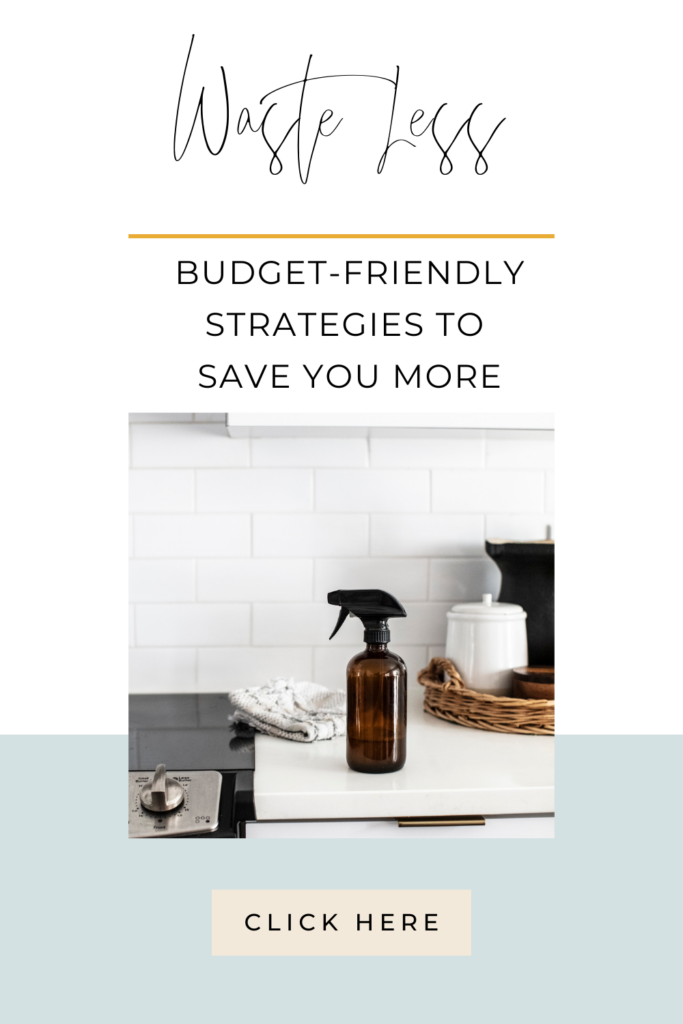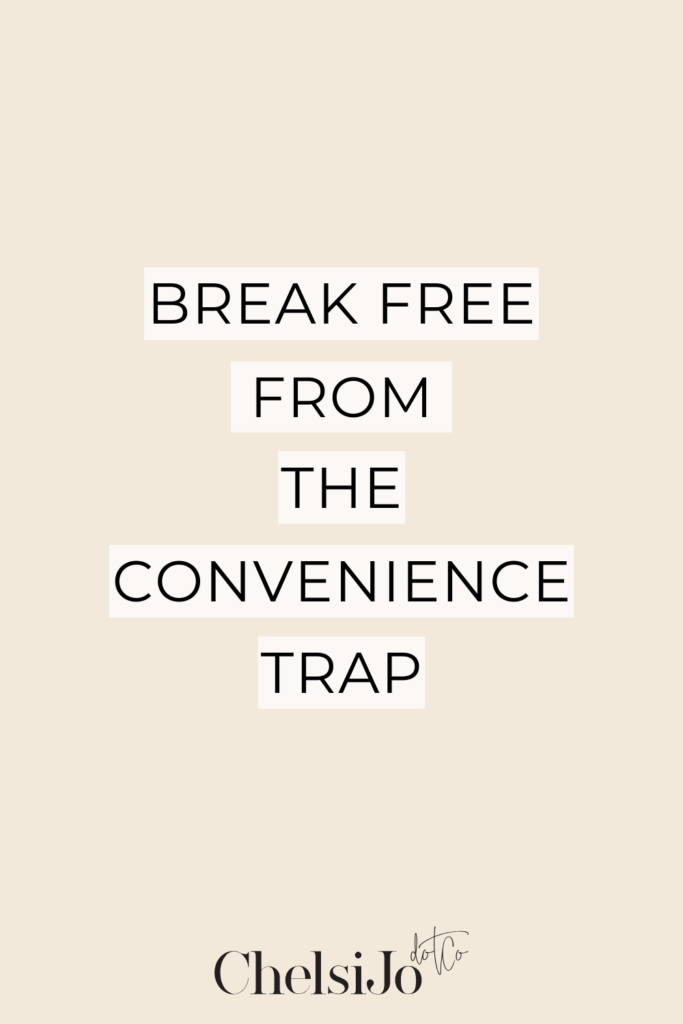Have you ever wondered what it would be like to save just a little bit of extra cash each week, to the point where it would add up enough to actually matter throughout the month? In this post, I’m sharing one of my biggest pet peeves that will actually save you money and reduce waste. I’m also going to share a few different ways in which I have become a little creative in saving money within our finances and budget. I’m exploring the nooks and crannies of things you wouldn’t normally think of.
Listen below for the entire episode on The Systemize Your Life Podcast
Break Free from the Convenience Trap
My number one pet peeve is spending money on useless things. When we’re extra busy, we often resort to convenience, and can get trapped in this cycle. However, there comes a time when you have to draw a line in the sand and strike a good, proportionate balance. We often end up spending most of our money on things that either make us feel good, make something more convenient, or are a necessity.
If you can cut back on the things that make you feel good and the things that are convenient you’re going to save a bunch of money. The number one way to do this is by implementing systems. Without fail, if you put systems into place, you won’t need as much convenience because you’ll have more time. You’ll also experience an intrinsic motivation. This triggers the release of feel-good hormones in your body. In turn this reduces the need to spend money on things just to make yourself feel better.
“If you put systems into place, you won’t need as much convenience because you’ll have more time.”
Finding Balance in Convenience: A Journey to Reduce Waste and Save Money
For a couple of years, I found myself in a situation where we had to rely heavily on Trader Joe’s meals. Although we still occasionally do, I’ve significantly reduced it despite the amazing convenience it offers, which saves me a lot of time. At some point, I realized I could no longer control all the nourishment, micronutrients, and even some of the macronutrients I was providing my family due to the convenience. That’s when I decided we needed to find a balance that I felt comfortable with.
Our fast-paced need for convenience is actually producing a lot of waste of money and food. I’m the first person to recommend buying a bag of pre-cut broccoli. My mom, on the other hand, would advise purchasing the whole broccoli and cutting it yourself. She’s the type of person who can teach you how to save a dime, or even 45 of them.
My mother is the most frugal person I’ve ever met on the entire planet. She’s incredibly creative in finding ways to save money. I grew up with a deep understanding of how to magically transform three items from the refrigerator into a complete meal. Everything seemed to last forever because she consistently reused and made things work. I witnessed this approach applied to absolutely everything. I’m aware that doing this not only reduces waste but also saves you money.
Reducing Waste and Preserving Nature’s Bounty
By definition, I consider myself to be crunchy. I make a genuine effort to preserve the real foundation and roots of creation. This is especially true for those that are grown and intended to be consumed in their natural state. I’m mindful of the impact our choices have on the amount of trash we generate as a family. I’m constantly evaluating and refining my systems to reduce waste and consumption. Through these efforts, we’ve managed to significantly cut our expenses and save money. That’s why I wanted to share this post with you.
Save Money and Reduce Waste: The Disposable Dilemma
I’m always surprised when I see certain items sold in bulk at stores like Target, Walmart, and Costco. I recently walked through one of those aisles with my husband, Blaine, and we couldn’t believe people actually purchased these things. It got me thinking about what people buy in bulk to save money, and surprisingly, some mentioned items like paper plates, utensils, plastic cups, and napkins, which I never considered buying in bulk.
And then I had a moment and thought, ‘I can’t purchase disposable items like this. The thing is that I get it. I completely understand that dishes pile up, and it’s exhausting. It’s the last thing you want to deal with.
The Convenience of Disposable Items
When we moved, we were going through the grocery store, and the house was filled with boxes. I still hadn’t packed up my dishes because I kept wondering what we were going to use to eat on. As an exception I reasoned it would be okay to buy paper plates this time. I felt like I was indulging excessively. I did a bit of research at Costco. If a simple family of four buys these and uses them three times a day, seven days a week, it adds up to $350. You might not actually do that because you’re probably eating out a lot.
Either way, you could be saving hundreds of dollars in your monthly budget, funds that could be directed toward paying off your car, reducing debt, or investing in an online program you really want. These are the things we often think we can’t afford, but it’s crucial to examine where your money is going. The number one item you can stop buying immediately—never place it in your cart again.
Let me help you ensure that your dishes are cleaned twice a day, every single day, and you never have dirty dishes piling up in your sink. You’ll always have cups, plates, forks, knives, and spoons ready. Now, I understand you may not want to go completely paperless like I have. We’ll discuss various options for reusing items around your house. If you prefer using paper towels or napkins, that’s okay too. But consider starting with the other three options I’m going to share with you.
Mastering Money Management: A Budgeting Breakthrough
I first learned this concept from Dave Ramsey, an excellent starting point with tons of information and resources. We began with his approach a long time ago and then developed our own system within our family, which I teach as a bonus for all our VIP Systemize Your Life students. If you’re a VIP student, you have access to our complete budgeting system, which is a game changer.
Even if you’re not part of the program and don’t plan to join soon, Dave Ramsey offers numerous valuable options. He has a program called Financial Peace University that delves deep into budgeting. My system is an offshoot of that. I created a hybrid by combining that knowledge with what I learned from Mike Michalowicz’s Profit First, resulting in a zero-based budgeting model with a percentage approach for our family.
In the first month of using this system, we identified areas where we were overspending and saved $800. Just by looking at the little things like this, we immediately had an extra $800 in our pocket. It’s time for me to share the other things that we stopped buying in order to be able to save money and some systems that we put in place to be able to reduce the consumption and reduce consumerism in order to save some money.
Tip #1 – Reduce Waste by Ditching Store-Bought Cleaners for Homemade Solutions
One category I’ve transitioned away from is cleaning products. I gradually stopped buying disposable surface wipes and started making my own reusable ones. These are washable and can be remade as needed. When I felt the need to have ready-to-use wipes, I continued making them. Additionally, I began making my all-purpose surface spray, which is incredibly effective. I use a concentrate which I only need to buy it every three months. This means I no longer purchase cleaners from Walmart, Target, or anywhere else. I make all of them at home, including toilet cleaner. I purchase a concentrate, which lasts a long time.
Effective and Eco-Friendly Cleaning Alternatives to Reduce Waste
I also use a pumice stone for DIY cleaning and an all-purpose scrub that I make. I bought a bulk bag of baking soda from Costco, which has lasted me over a year, and a large jug of vinegar, which has lasted forever. You can find links to these chemical-free cleaning products here. All of this is taught inside of Systemize Your Life including the recipes and how to make them.
Green Laundry Practices and Ditching Toxic Dryer Sheets
I also switched to using a concentrate for laundry soap, which is more cost-effective. I store it in a big glass jar, making it convenient when I run out of something.
I’ve also stopped buying dryer sheets, as they’re toxic. Instead, I use wool dryer balls, which are a one-time investment and last indefinitely.
There are many other items in this category, but these are a few simple and cost-effective changes. Keep in mind that while some initial investments may seem higher, you’ll no longer need to repeatedly purchase these items every time you go to the store.
Tip #2 – Reduce Waste and Maximize Savings With Meal Planning and Leftover Management
Making the most of the food in your fridge is crucial to reduce waste. If you don’t plan your meals before going to the store and just buy whatever, you’re likely to either over-purchase ingredients for complicated recipes that you never make, resulting in food waste. Either way, you’re probably tossing out food every week.
I recently had to throw out expensive lamb meat because I’m cautious about food safety, having experienced food poisoning three times in my life. I have a highly sensitive sense of smell, and I can detect odors from quite a distance. I’m particular about cooking and consuming food soon after purchase. I prefer cooked food that sits in the fridge for two to three days and then goes into the freezer, rather than having uncooked food. Occasionally, we dine out more than planned, and that meal I was supposed to cook goes to waste, along with the money spent on eating out. This is where having a meal planning system can be incredibly helpful.
Meal Planning Systems to Reduce Waste
Make sure you’re eating your leftovers or storing them in the freezer, know your meal plan for the week, and maintain a simple grocery list. Reusing the same grocery list with a few adjustments can be a great idea. Additionally, consider whether taking your kids to the store will affect your budget positively or not. Sometimes, taking the whole family can lead to more items in the shopping cart, but it ensures they get the food they want for the week. Review your meal planning and leftovers utilization; it’s a significant area in your budget where you can save a substantial amount of money.
Tip # 3 – Using Reusable Products to Reduce Waste
Last but certainly not least, one of my favorites is considering reusable products. There are many items in your home that you could systematically set up for repeated use. Take a moment to look around your house right now and consider if there’s anything you could gradually replace over time. The initial investment may seem higher compared to the cheaper items you buy every single month or week at the store. However, these replacements could lead to long-term savings.
Water Bottles
If you’re purchasing disposable water bottles from the store, stop immediately. You’re wasting money. Take a moment to research the microplastics you’re drinking. Get a reusable water bottle for yourself and each family member – one good quality bottle is all you need.
Reusable Bags
When it comes to reusable bags (like Ziploc bags), I bought a pack of them when we moved because I hadn’t unpacked all my reusables yet, and then we gradually phased them out. However, I did end up buying little snack bento boxes for the kids’ school snacks. These snack boxes work great for them. But for general use like needing a Ziploc bag, there are numerous options available on Amazon.
One of the most popular brands is ‘Stasher,’ They work really well and are made of silicone with functional zippers. However, they can be a bit time-consuming to close and zip, depending on whether you want them to be 100% leak-proof. There are various options out there, so feel free to experiment and find what works best for you. Even if you try some and they last a year before you decide you don’t like them anymore, you’ll still have saved yourself a lot of time and money. Plus, there are other incredible benefits for your health and the environment.
Beeswax Covers
The one thing I haven’t switched to, and it’s mainly due to inertia, is tin foil. I like to have it on hand just in case I need it for something, but it’s not a regular part of my cooking routine. Right now, it kind of is, but what I really want to switch to are beeswax covers. There are numerous alternatives out there for replacing plastic wrap, and while tin foil serves a different purpose because it can be used for baking, there are plenty of options. Personally, I haven’t made the switch yet, as I’ve experimented with various products but haven’t found one I absolutely love.
Glass Jars
Glass jars are another favorite of mine. They work exceptionally well as replacements for Ziploc bags, especially for adults. Whenever I need to pack a snack in my bag, I use a small mason jar typically meant for jam. They are compact, washable, reusable, sealable, waterproof, and simply amazing.
Glass jars serve as containers for my homemade room spray, which is a simple mixture of water, essential oils, and, optionally, rubbing alcohol or witch hazel to aid in evaporation. I haven’t purchased room spray in ages; we keep reusing it over and over.
Reusable wipes
With my second child, I also switched to reusable wipes. I would wet them, put them in a reusable ziplock bag, toss them in the diaper bag or my purse, and we’ve been using the same set to this day. Frankie is now 11, and Bailey is six, and these wipes have been with us the entire time.
I bought old-fashioned baby washcloths that are tiny squares and super thin. They work amazingly well as wet wipes. They’re perfect for cleaning sticky fingers after a lollipop or popsicle at a playdate, instead of always relying on disposable ones. I know it might seem like it takes extra time and adds to the laundry, but I’ve systemized it, making it part of our routine. I’ve simplified other things in my life, so that I can make time and make space for these things.
Taking Action: Transforming Money-Saving Ideas into Lifestyle Changes
I hope that you found a couple of these tips to reduce waste helpful. You got your wheels turning, and you actually go out and you start implementing and trying to make this happen in your home in your own life.
Today’s post is brought to you and inspired by my Facebook community. If you’re not already a part of my incredibly free and fun Facebook community, you definitely should head over there. So we have really engaging and fun and actually educational helpful, that’s 100% a total networking space for you to for you to get to know 1000s of other work from home and stay at home moms, to be able to not feel so alone and connect with other people that are just like you, but also learn a lot more about what you read here on the blog or hear on the podcast.


Frequently Asked Questions
Do you have an tips for getting started with meal planning?
Absolutely! In an earlier post I shared 5 practical steps to a simple meal plan and easy weeknight dinner ideas where you can grab my menu board meal planning cards. Don’t forget to pop into the Facebook group for meal ideas or to join Systemize Your Life to have access to the organized meal bank.


